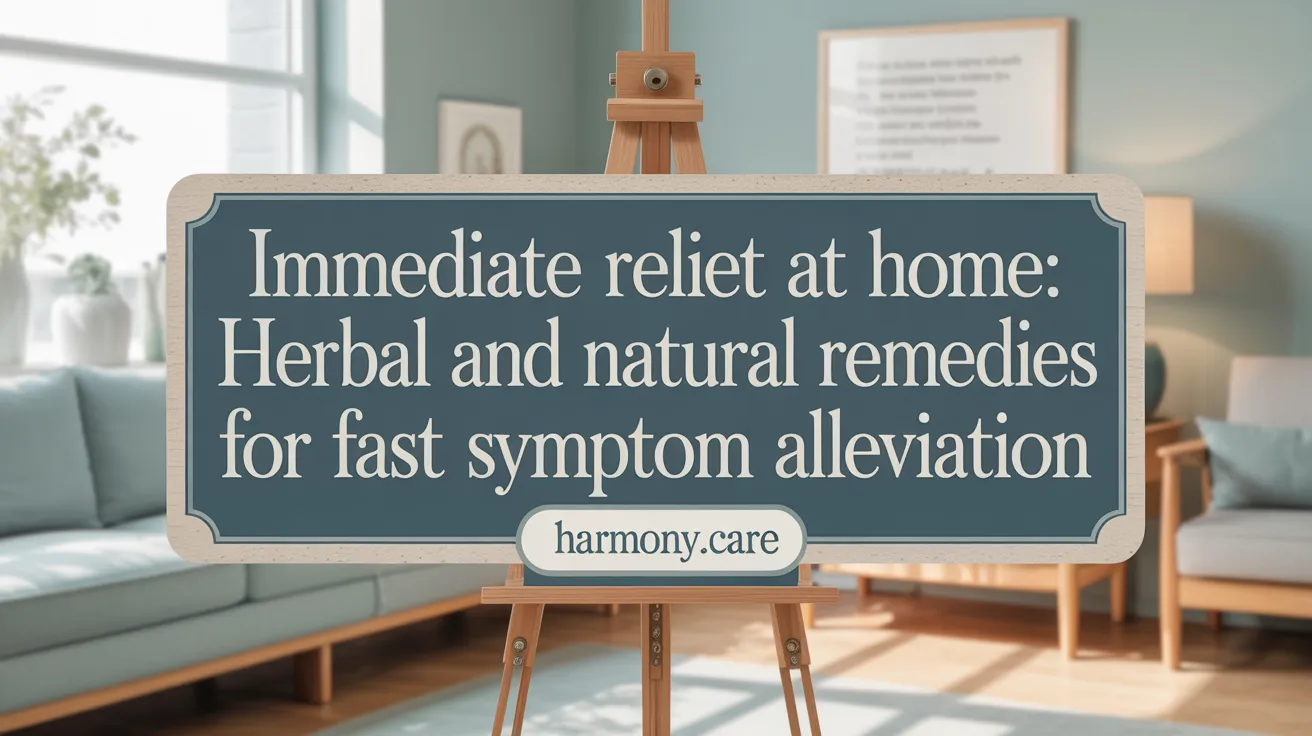Embracing Drug-Free Solutions in Immediate Healthcare
In today's fast-paced world, many seek urgent care options that go beyond conventional medication to manage mild to moderate health concerns. Natural and holistic remedies, combined with accessible healthcare services like urgent care and telemedicine, provide empowering, drug-free alternatives. This article explores the range of natural treatments and complementary therapies that support urgent care needs while highlighting how they integrate with modern healthcare practices to offer safe and effective relief.
Natural Remedies for Common Illnesses and Ailments

What natural remedies can soothe sore throats and reduce cold symptoms?
Herbal teas made from licorice and slippery elm are excellent natural options for soothing sore throats, as they coat the throat and reduce irritation. Honey stands out as a powerful cough suppressant due to its natural antiviral and antimicrobial properties; it can be consumed directly or added to warm tea for relief. Other notable natural remedies include elderberry syrup and echinacea, both of which may shorten the duration and severity of cold symptoms when used early. Additionally, pelargonium is known to help reduce the length and intensity of colds.
Which natural substances assist with digestive and skin issues related to minor illnesses?
Ginger is widely valued for relieving upset stomach, nausea, and motion sickness, making it a popular natural remedy for digestive discomfort. Probiotics, found in foods like yogurt, miso, and supplements, promote digestive health and can help manage diarrhea caused by infections or antibiotics. For skin issues, tea tree oil acts as an anti-inflammatory agent effective against bacterial and fungal infections such as acne and athlete’s foot. Calendula is also beneficial, used to calm skin irritations including eczema and diaper rash.
How can natural approaches support anxiety reduction and improve sleep?
Chamomile tea is often recommended in the evening for its calming effects which promote restful sleep. Lavender aromatherapy oil is another natural aid frequently used to relax the mind and body. To further reduce anxiety, calming techniques such as deep breathing exercises and listening to soothing music can activate the parasympathetic nervous system, encouraging relaxation. Emotional preparation strategies also contribute positively to managing stress and fostering mental well-being.
These natural remedies offer accessible, gentle approaches to managing common symptoms and enhancing overall wellness. Always consider consulting a healthcare provider before integrating herbal treatments, especially during pregnancy, breastfeeding, or when taking medications.
Using Integrative Medicine and Complementary Therapies in Urgent Care

What is integrative medicine and how does it complement urgent care?
Integrative medicine treats the whole person—mind, body, and spirit—using evidence-based methods. It blends conventional approaches like medication and psychotherapy with complementary therapies such as acupuncture, yoga, massage, and Chinese herbal medicine. This approach supports natural healing, eases stress, promotes relaxation, and empowers patients to manage their health. When combined with urgent care, integrative medicine offers holistic options alongside traditional treatment, enhancing recovery and well-being. Learn more about the benefits of integrative medicine.
Which complementary treatments benefit patients with musculoskeletal pain or chronic conditions?
Several therapies help manage pain and chronic issues effectively. Acupuncture can relieve headaches, arthritis, menstrual cramps, and injury pain by stimulating specific body points. Massage therapy alleviates muscle tension, promotes relaxation, and improves blood flow. Mindfulness practices as well as gentle exercises like yoga and tai chi reduce stress and support physical health. Herbal remedies such as turmeric, ginger, and arnica—taken orally or applied topically—have anti-inflammatory and pain-relieving effects. For holistic approaches to musculoskeletal pain relief and herbal remedies, see holistic approaches to musculoskeletal pain.
How can these therapies be integrated in urgent care settings?
Urgent care centers can complement their traditional services by offering or referring to integrative therapies. For example, massage therapy might be used alongside injury management to speed muscle recovery. Acupuncture and herbal medicine can address chronic pain and inflammation while reducing reliance on medications. Mindfulness techniques and gentle movement exercises can help patients cope with stress linked to illness or injury. This combination supports a patient-centered and comprehensive care experience. For more on urgent care services and integrative approaches, visit Urgent care services and integrative medicine and Urgent care treatment for non-life-threatening conditions.
Accessible Urgent Care Services and Natural Treatment Integration

What types of illnesses and injuries can urgent care treat without drugs?
Urgent care centers are equipped to handle a broad range of non-life-threatening illnesses and injuries without necessarily relying on drug treatments. These include mild to moderate asthma attacks, minor infections like urinary tract infections and bronchitis, simple fractures, sprains, small lacerations, and skin conditions such as boils and abscesses. Beyond injury and illness treatment, urgent care centers also provide vaccinations, routine physical exams, and screenings for conditions like diabetes, cholesterol issues, and thyroid disorders, all of which can be managed with or without medication depending on individual cases. Learn more about urgent care treatment for asthma, minor lacerations, UTI, bronchitis, and non-life-threatening condition care.
How do walk-in clinics, telemedicine, and pharmacy consultations support natural and drug-free urgent care?
Walk-in clinics offer a convenient, face-to-face option for mild to moderate health issues. Staffed primarily by nurse practitioners, they can recommend natural remedies and lifestyle changes when appropriate. Telemedicine services expand access by allowing patients to consult healthcare providers virtually, where symptom assessment and advice, including natural treatment options, can be discussed. Pharmacy consultations provide immediate access to medication management, but also personalized advice on non-drug methods such as natural or complementary therapies. Pharmacists can support treatment adherence and identify early signs that may benefit from holistic interventions. For information on telemedicine, pharmacy consultations, and natural healthcare alternatives and prescription refills without a doctor, see these resources.
Natural remedies are often suggested, including licorice and slippery elm tea for throat irritation, honey for sore throat and cough, echinacea for cold symptoms, elderberry syrup, ginger for nausea, and probiotics for digestive health. Always consult a healthcare provider before using herbal remedies.
When is urgent care appropriate?
Urgent care is suitable for sudden illnesses or injuries that require prompt attention but are not life-threatening. Examples include minor fractures, minor asthma attacks, simple infections, mild to moderate sprains, and certain skin conditions. It is a practical alternative to the emergency room for these conditions, offering reduced wait times and lower costs compared to ER. For conditions needing complex or emergency treatment, such as chest pain or severe trauma, emergency room care is necessary. Patients with less severe symptoms may also consider walk-in clinics or telemedicine, especially when drug-free or natural therapies are preferred.
Refer to when to use urgent care, ER, and telehealth options and guidelines on emergency situations and symptoms requiring ER.
Home and Herbal Remedies for Immediate Symptom Relief

What home remedies help relieve cold and flu symptoms without drugs?
Staying well hydrated with water, herbal teas, and clear broths is essential as it helps loosen mucus and soothes dry throats. Warm liquids like chicken soup and ginger tea not only provide hydration but also offer anti-inflammatory and soothing benefits. Steam inhalation, sometimes enhanced with eucalyptus or peppermint oils, is a natural way to clear nasal congestion and ease breathing. Gargling with warm salt water can reduce inflammation and discomfort in the throat.
Topical applications such as arnica cream can effectively soothe muscle aches and minor pains associated with illness. Additionally, honey serves as a gentle remedy to relieve coughing due to its antimicrobial and throat-coating properties.
What precautions should be taken when using natural remedies?
While many herbal supplements like echinacea and zinc are popular, scientific evidence supporting their effectiveness is inconclusive, and they should be used with caution. It is recommended to consult a healthcare provider before starting herbal treatments, especially if you are pregnant, breastfeeding, or currently taking other medications.
Safe practice is vital when using remedies such as nasal irrigation—always use sterile or distilled water to avoid infections. Moreover, honey should never be given to children under one year of age to prevent risks of infant botulism.
When to consult a healthcare provider
If symptoms worsen or persist beyond a few days, or if you have existing health conditions, seeking medical advice is prudent. Healthcare providers can help guide the safe and effective use of herbal remedies and ensure that any serious illness receives timely treatment.
Building a Holistic Urgent Care Experience with Drug-Free Focus

How can urgent care clinics promote and integrate natural and drug-free treatments?
Urgent care clinics are increasingly blending conventional care with natural, drug-free treatments to enhance patient outcomes. They can educate patients about home remedies like hydration, herbal teas, and steam inhalation, which provide comfort alongside medical treatment. Telemedicine platforms allow practitioners to discuss integrative medicine, including acupuncture or herbal supplements, adapting care plans with electronic medical record systems that track complementary therapies.
Patient engagement is key; clinics use online scheduling, messaging, and patient portals to share educational materials on natural therapies, empowering patients to participate actively in their healing process. For more on best practices, see 7 urgent care best practices for clinics to thrive.
What guidance helps patients decide between urgent care, emergency room, and natural remedies?
Choosing the right care setting depends on symptom severity. Urgent care is ideal for moderate, non-life-threatening issues such as respiratory infections or minor injuries, where natural remedies can safely complement medical treatment.
Emergency rooms should be reserved for severe symptoms like chest pain, severe bleeding, difficulty breathing, or major trauma.
Walk-in clinics handle mild to moderate conditions and offer quick access with nurse practitioners.
Patients should consult healthcare providers or use telehealth services for advice when uncertain, ensuring safe use of natural remedies and avoiding delays in necessary medical care. Additional guidance on alternatives to emergency care can be found in Alternatives to the ER.
Empowering Health Through Natural and Accessible Urgent Care
Natural and drug-free alternatives offer effective ways to manage common illnesses and minor injuries seen in urgent care contexts. From soothing herbal teas and topical remedies to integrative medicine and accessible telehealth services, patients have diverse options that address their whole well-being. By combining these approaches with the convenience and expertise of urgent care clinics, individuals can confidently navigate their health challenges while minimizing medication reliance and promoting holistic healing. Embracing these natural alternatives empowers people to take charge of their urgent care needs safely and effectively.
